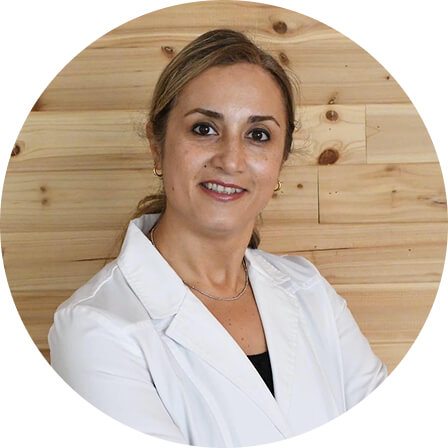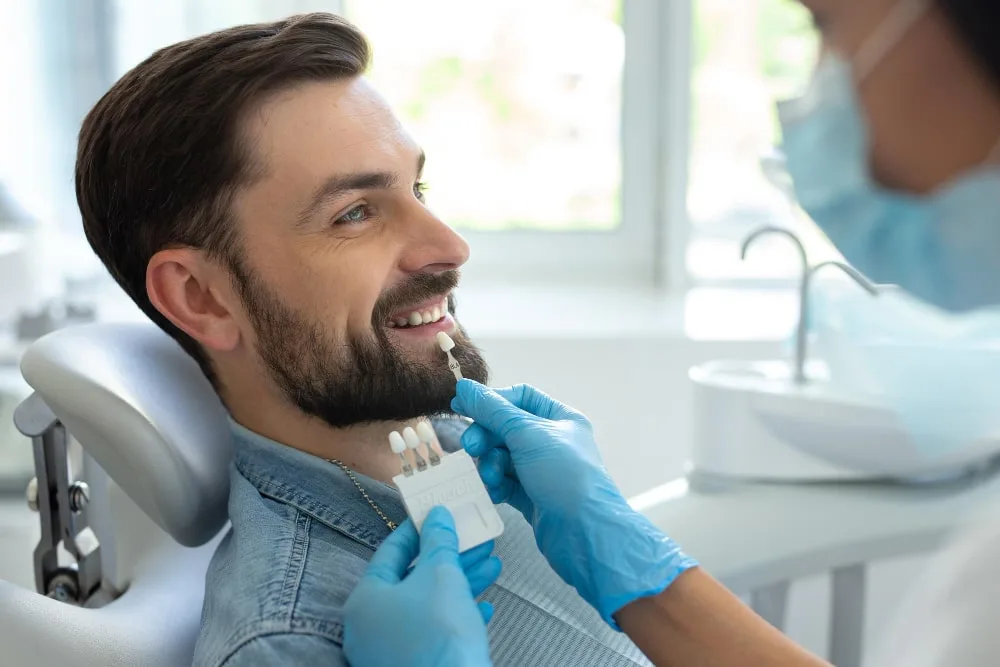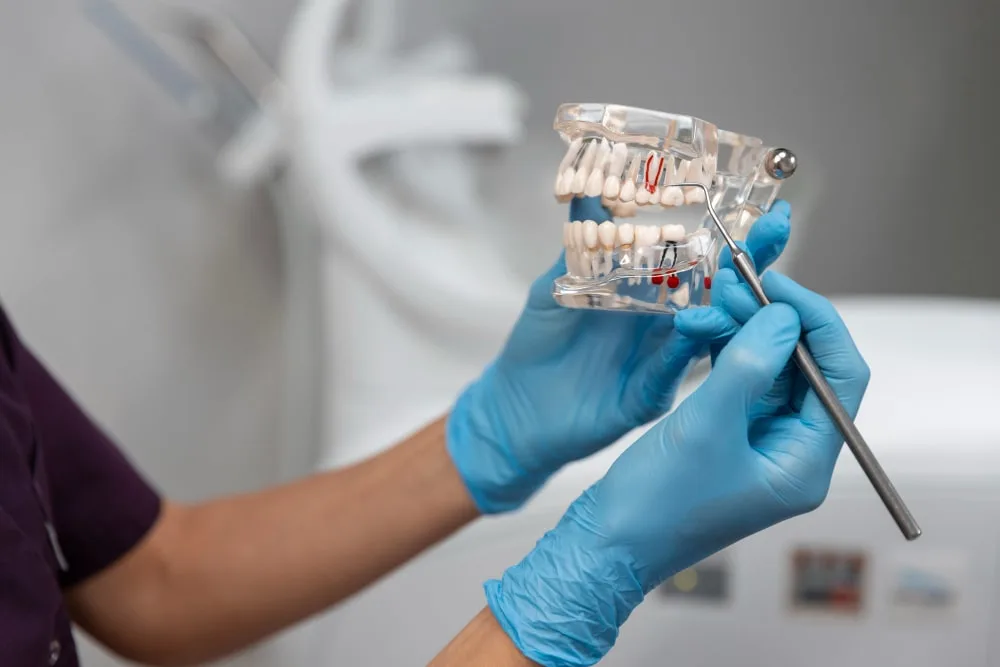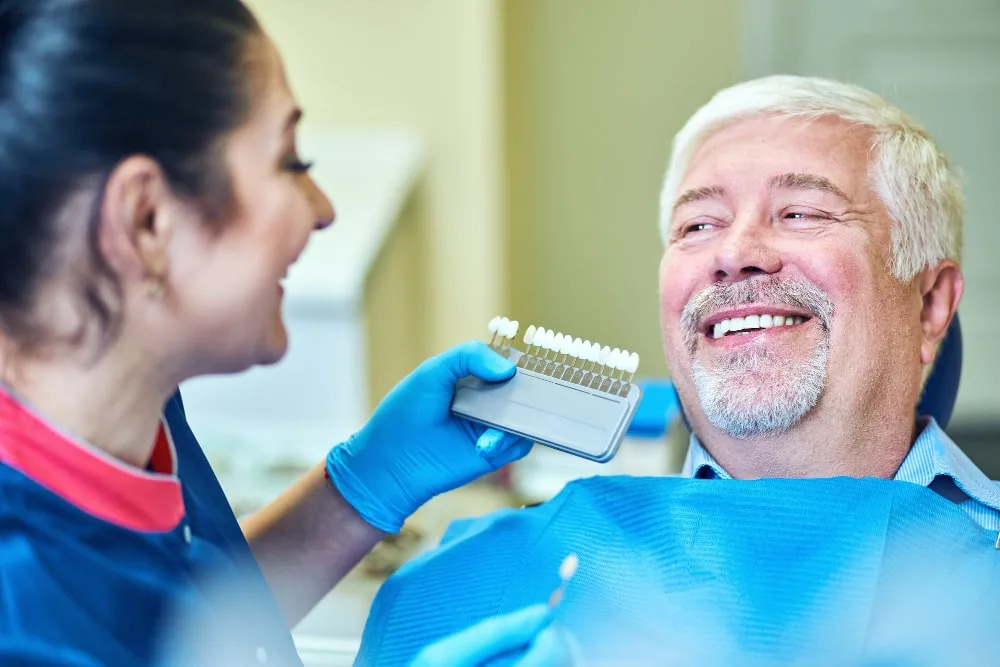Losing a tooth doesn’t mean you have to settle for anything less than a natural-looking, fully functional replacement. But understanding the cost can be tricky. In this guide, we’ll break down pricing for different implant options, explain why costs vary, and share ways to make treatment more affordable, without compromising on quality.
What Is a Dental Implant?
A dental implant is a small, biocompatible post—usually titanium or zirconia—surgically placed into the jawbone to act as an artificial tooth root. Once the implant fuses with the bone through osseointegration, an abutment connector and a custom crown, bridge, or full-arch prosthesis are attached to it, restoring natural chewing function, facial support, and aesthetics without relying on neighboring teeth.
Types of Dental Implants & Their Costs
Every implant package bundles the titanium or zirconia post, the abutment connector, and a custom crown or bridge. The table below provides an overview of dental implants and their corresponding price ranges
Implant Type |
Ideal Candidates |
Cost Range (USD) |
What’s Typically Included |
| Single-Tooth Implant | One missing or non-restorable tooth with healthy neighbors | $3,000 – $7,000 | CBCT scan, surgical placement, healing abutment, custom ceramic crown, two follow-ups |
| Implant-Supported Bridge | Two to four adjacent missing teeth | $5,000 – $15,000 | Two implants, multi-unit abutments, provisional bridge, final bridge, post-op care |
| All-on-4 / Full-Arch Implants | Edentulous patients or denture wearers seeking fixed teeth | $15,000 – $30,000 per arch | Extractions (if needed), 4-6 implants, same-day provisional, final zirconia bridge, IV sedation |
| Mini Dental Implants | Narrow bone ridges or denture stabilization when grafting isn’t feasible | $700 – $1,600 each; $4,000 – $8,000 for four-mini denture | Implant placement, locator attachments or denture reline, one follow-up visit |
| Zygomatic / Complex Implants | Severe upper-jaw bone loss (“no-bone” cases) | ~ $30,000 + per arch | General anesthesia, CT-guided placement, provisional bridge, extended post-op follow-ups |
*Ranges reflect typical all-inclusive “implant-to-crown” fees in the United States and can vary by anatomy, materials, and geographic region.
Average Dental Implant Costs in the USA
Across the United States, restoring a single tooth with a complete implant package (implant, abutment, and crown) generally falls in the $3,000 – $4,500 range.
On the high-overhead West Coast—cities like Seattle, San Francisco, and Los Angeles—clinics tend to quote toward the top of that spectrum at about $3,000 – $4,500 per tooth.
By contrast, Midwestern and many Southern offices often charge 10 – 15 % less, with some practices advertising full single-tooth implants packages closer to $2,700 – $3,800. For patients who require a full-arch solution, the popular All-on-4 protocol typically averages $12,000 to $25,000 per arch, although totals can increase when premium materials or extensive preparatory work are involved.
| State/District | Average Cost |
| Alabama | $1,790 |
| Alaska | $2,595 |
| Arizona | $2,138 |
| Arkansas | $1,825 |
| California | $2,730 |
| Colorado | $2,161 |
| Connecticut | $2,230 |
| Delaware | $2,129 |
| District of Columbia | $2,518 |
| Florida | $2,130 |
| Georgia | $1,962 |
| Hawaii | $3,565 |
| Idaho | $2,165 |
| Illinois | $2,207 |
| Indiana | $1,903 |
| Iowa | $1,861 |
| Kansas | $1,891 |
| Kentucky | $1,930 |
| Louisiana | $1,932 |
| Maine | $2,191 |
| Maryland | $2,454 |
| Massachusetts | $2,781 |
| Michigan | $1,951 |
| Minnesota | $2,012 |
| Mississippi | $1,848 |
| Missouri | $1,866 |
| Montana | $2,092 |
| Nebraska | $1,909 |
| Nevada | $2,120 |
| New Hampshire | $2,232 |
| New Jersey | $2,255 |
| New Mexico | $1,939 |
| New York | $2,223 |
| North Carolina | $1,964 |
| North Dakota | $1,955 |
| Ohio | $1,989 |
| Oklahoma | $1,806 |
| Oregon | $2,294 |
| Pennsylvania | $2,067 |
| Rhode Island | $2,342 |
| South Carolina | $1,953 |
| South Dakota | $1,900 |
| Tennessee | $1,935 |
| Texas | $1,972 |
| Utah | $2,129 |
| Vermont | $2,241 |
| Virginia | $2,095 |
| Washington | $2,428 |
| West Virginia | $1,893 |
| Wisconsin | $2,001 |
| Wyoming | $1,980 |
Additional Costs That Add Up
Diagnostic imaging and site preparation can materially shift your final bill. An itemized estimate ensures nothing is overlooked.
- 3-D CBCT Scan: $200 – $450 (often waived if you proceed with treatment).
- Bone Graft: $550 – $5,100 depending on material and extent.
- Sinus Lift (upper jaw): $1,500 – $5,000.
- IV Sedation / General Anesthesia: Local add-on $50 – $200; IV $400 – $1,500 per hour.
- Extractions & Site Preparation: Simple, $150 – $300; surgical, $300 – $600 each.
- Maintenance Accessories: Occlusal guard or water flosser ($100–$300).
Factors Influencing Dental Implant Pricing
Dental implant fees are determined by a combination of clinical complexity, material selection, and practice overhead, rather than a one-size-fits-all schedule. The factors below explain why two similar-looking cases can generate markedly different estimates and how each line item contributes to the overall value of your treatment plan.
- Anatomy & Complexity: Limited bone, nerve proximity, or sinus involvement raises surgical time.
- Material Choice: Premium titanium alloys or zirconia posts are more expensive.
- Implant System & Lab: Brand-name implants and CAD/CAM ceramic labs command higher fees.
- Surgeon’s Credentials: Board-certified implantologists with advanced residency training typically charge premium rates to reflect their expertise.
- Technology Stack: Digital scanners, guided-surgery stents, and in-house milling add convenience and overhead.
- Geography & Facility Overhead: Urban rents and staff wages translate into higher chair fees.
Insurance Coverage & Financing Options
Most dental PPOs reimburse roughly 50 percent of an implant’s cost, but only up to the plan’s annual maximum (usually $1,500–$2,000), although some premium policies offer higher coverage. Because most benefits reset on January 1, starting part of the work in December and finishing it in early January allows you to tap into two plan years, effectively doubling the coverage window. Any remaining balance can be paid with tax-advantaged HSA/FSA funds or spread over 6–60 months via third-party financing, such as CareCredit or an in-office membership plan.
Tips to Save on Dental Implants
While dental implants are a long-term investment, strategic planning can substantially reduce what you pay out of pocket. By comparing comprehensive quotes, optimizing insurance timing, and exploring alternative treatment settings or financing programs, you can lower costs without compromising surgical safety or restorative quality.
- Compare Comprehensive Quotes: Evaluate full “surgery-to-crown” quotes rather than low teaser fees.
- Leverage Insurance Calendar: Start extractions in December and place implants in January to double annual benefits.
- Consider Dental Schools & Residency Programs: Supervised by specialists, often 30 – 50 % cheaper.
- Maintain Oral Hygiene: Good home care avoids costly peri-implantitis repairs.
- Ask About In-House Membership Plans: Many practices offer 10 – 15 % off major services for an annual fee.
Pros of Dental Implants
- Permanent and long-lasting: With proper care, implants can last 20+ years or even a lifetime.
- Natural look and feel: Implants closely mimic the appearance and function of a real tooth.
- Preserves jawbone health: Unlike bridges or dentures, implants help prevent bone loss by stimulating the jawbone.
- No impact on nearby teeth: The adjacent teeth aren’t impacted during or after the procedure.
- Improved chewing and speech: Feels stable and comfortable, allowing for normal eating and speaking.
Cons of Dental Implants
- Higher initial cost: The cost is higher compared to options like bridges or partial dentures.
- Surgical procedure required: Implant placement involves minor oral surgery, which carries typical risks such as infection, nerve damage, and more
- Longer healing time: The entire process (from implant to crown placement) can take several months.
- Not suitable for everyone: Patients with poor bone density or certain medical conditions may not be good candidates without additional procedures.
- Possible additional costs: Bone grafting or sinus lifts may be needed before the implant can be placed, thus adding to the cost.
Why Consult Dr. Ellie Javadi for Dental Implants in Seattle
Dr. Ellie Javadi, DDS, MSD—a Loma Linda–trained periodontist and multiple-time Seattle Met “Top Dentist”—leads Orchid Periodontics & Dental Implants, where she combines CBCT-guided planning, custom digital surgical guides, and proven biomaterials to deliver single-tooth, multi-unit, and full-arch restorations. Her periodontal specialty ensures each implant plan begins with a thorough assessment of gum and bone health, creating a stable foundation for long-term success. Recognized by leading dental societies and with hundreds of transformative cases in Seattle, Dr. Javadi has perfected a technique that strikes a balance between precision and empathy. Her commitment to excellence makes her a top choice for implant dentistry.
Discover your best-fit implant solution today—Call (425) 775-2002 or click here to request an appointment online with Dr Javadi.



